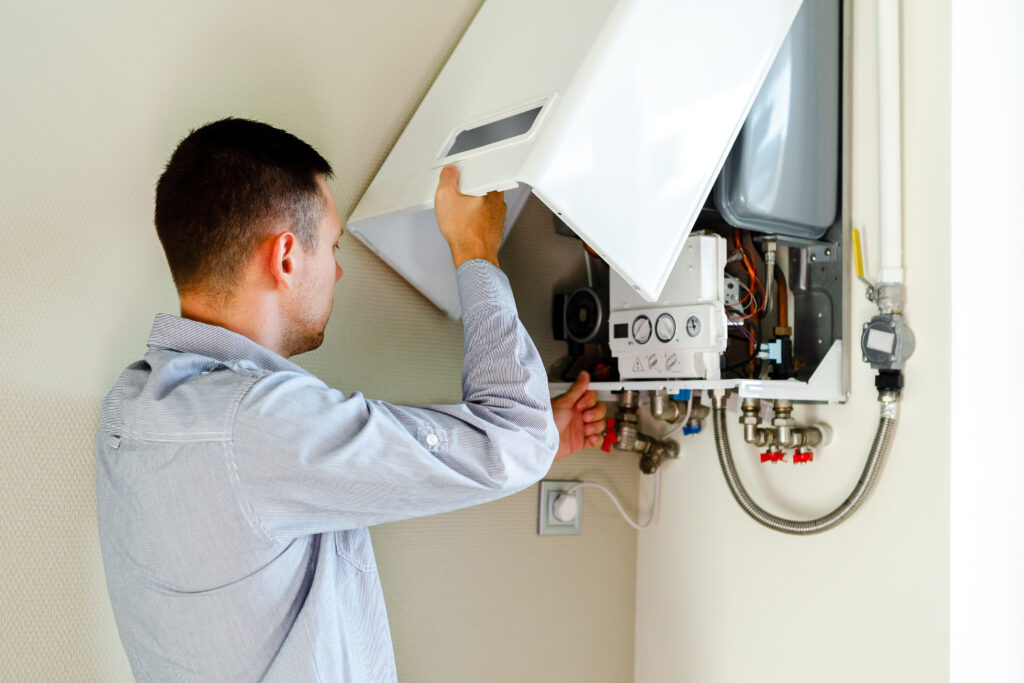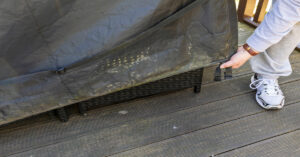
Plumber attaches Trying To Fix the Problem with the Residential Heating Equipment. Repair of a gas boiler
Boilers play a crucial role in maintaining a warm and comfortable home, especially when the temperature drops. Despite their importance, boilers can experience issues that may impact their performance. By recognizing typical boiler problems and knowing how to tackle them, you can avoid unnecessary inconvenience and costs. Here’s a straightforward guide to some common boiler issues and practical solutions that can help keep your heating system running smoothly.
Lack of Heat
One of the most frustrating issues with a boiler is when it fails to produce heat. This problem can stem from various causes, including a malfunctioning thermostat, low water pressure, or airlocks in the system. First, verify that the thermostat is set to the correct temperature and is in good working condition; replacing batteries or recalibrating may be necessary. Next, check the water pressure gauge; if it’s below the recommended level (typically 1-2 bars), you’ll need to repressurize the system by opening the filling loop until the pressure reaches the desired range. Airlocks can also impede heat distribution—bleeding the radiators can release trapped air and restore efficiency. Additionally, ensure the pilot light is on and the boiler burner is not clogged, as these can also lead to heating failures. If these steps don’t resolve the issue, it may be time to consult a professional technician to inspect for more complex problems like valve failures or pump malfunctions.
Strange Noises
Hearing your boiler produce unusual noises like banging, whistling, or gurgling can be an indication that something isn’t functioning right. These sounds often indicate trapped air within the system, low water pressure, or limescale buildup in the pipes. To tackle trapped air, bleed your radiators by using a radiator key to open the bleed valve—this will release any trapped air and normalize the system’s functionality. Low water pressure can often be corrected by topping up the pressure using the filling loop until it reaches between 1-2 bars. Limescale, especially common in hard water areas, can settle in the heat exchanger, reducing efficiency and causing kettling sounds. Using a magnetic filter or a water softener can help manage and prevent limescale. If the noises persist despite your best efforts, it may be worth investing in a professional power flush to remove internal debris or consulting a heating engineer to inspect components such as the pump or expansion vessel for faults. Regular maintenance and system check-ups can also go a long way in preventing these noises from recurring.
Leaks
Leaking boilers are not just a nuisance but also a serious hazard that needs immediate attention. Common causes of leaks include damaged seals, corroded pipes, or excessive pressure within the system. If you notice water pooling around your boiler or dripping from pipes, turn off the unit right away to prevent further damage. Begin by identifying the source of the leak: check seals around pumps and valves, which can deteriorate over time and may require replacement. Inspect pipes for signs of corrosion, especially in older systems, as corroded pipes can lead to significant leaks and even flooding. Additionally, high pressure can force water out of pressure relief valves; ensure that the system pressure is within the recommended range (typically 1-2 bars) and adjust if necessary using the filling loop. Regularly servicing your boiler can prevent these issues by identifying and addressing wear and tear before it becomes problematic. For severe or persistent leaks, consult a licensed heating professional to perform a thorough inspection and necessary repairs, ensuring your home remains safe and comfortable.
Pilot Light Goes Out
A pilot light that repeatedly goes out can stem from a faulty thermocouple, a blocked pilot jet, or fluctuations in gas supply. To address this, first, ensure there are no gas leaks and follow the manufacturer’s safety instructions for relighting the pilot light. A common fix includes cleaning the pilot jet, which can become clogged with debris. Use a thin wire to gently clear any blockages. If the pilot light continues to go out, the thermocouple may be faulty. This safety device detects whether the pilot light is lit and shuts off the gas supply to prevent leaks if it’s not working correctly. Replacing the thermocouple is a relatively simple task that can be done with basic tools, but if you’re unsure, it’s always best to consult a professional. Additionally, check your gas supply pressure; inconsistency can cause the pilot light to go out. Sometimes, adjusting the regulator can stabilize the gas flow. Overall, regular maintenance and prompt attention to pilot light issues can prevent more serious problems down the line, ensuring your boiler remains safe and efficient.
Frozen Condensate Pipe
During the colder months, one common issue homeowners face is the freezing of the condensate pipe, which can disrupt the boiler’s operation. If your boiler displays an error code indicating a frozen condensate pipe, it’s essential to act promptly to restore functionality. To safely thaw a frozen condensate pipe, pour warm (not boiling) water over the length of the pipe or wrap it with a hot water-soaked towel. Avoid using open flames or boiling water, as these can damage the pipe. Additionally, consider insulating the pipe with weather-resistant foam insulation or heat tape to prevent future freezing. Rerouting the pipe indoors where it’s less exposed to freezing temperatures is another effective strategy. Ensuring regular maintenance, especially before winter, and checking the pipe regularly after heavy snowfall or severe cold snaps can further help prevent the inconvenience and potential costs of a frozen condensate pipe.
Regular maintenance and prompt attention to boiler problems can prolong its lifespan and ensure efficient operation. If you encounter persistent issues or feel unsure about handling repairs yourself, don’t hesitate to contact a qualified plumber like Local Plumbing for professional assistance with your boiler repair needs.
By staying informed about common boiler problems and their solutions, homeowners can effectively troubleshoot minor issues and maintain their heating systems in optimal condition throughout the year.


